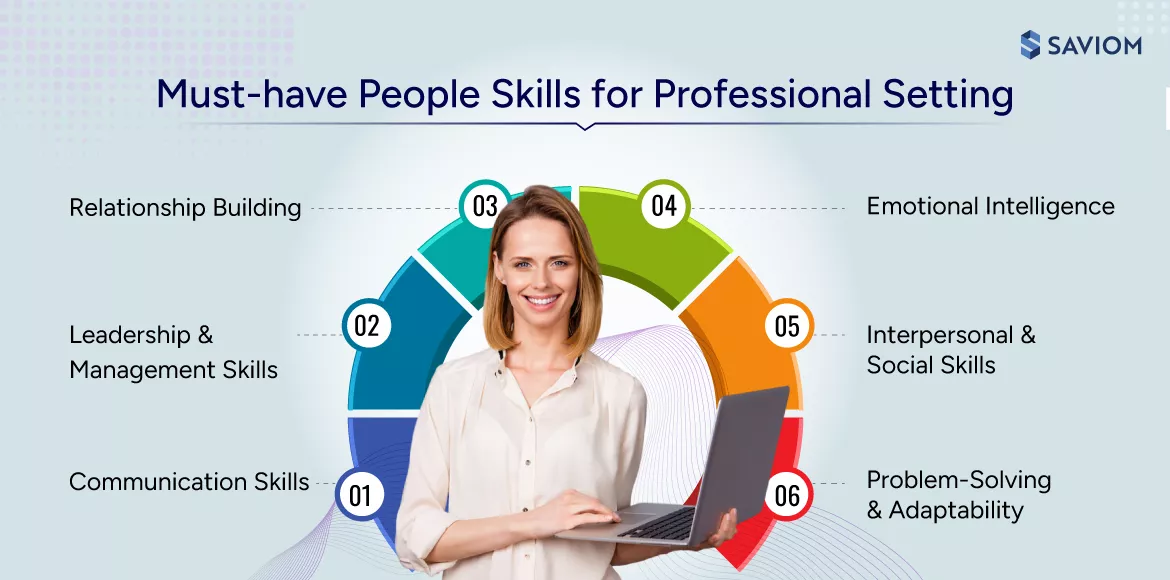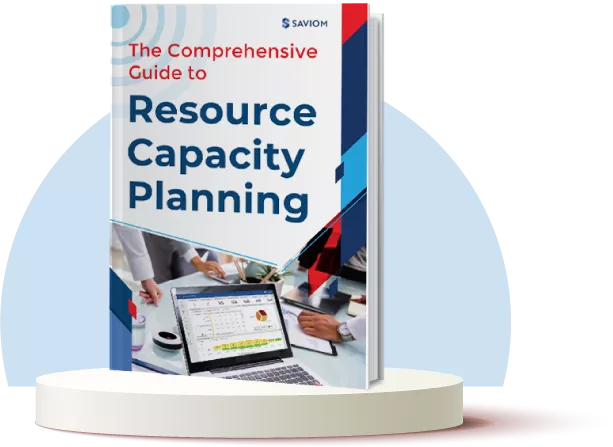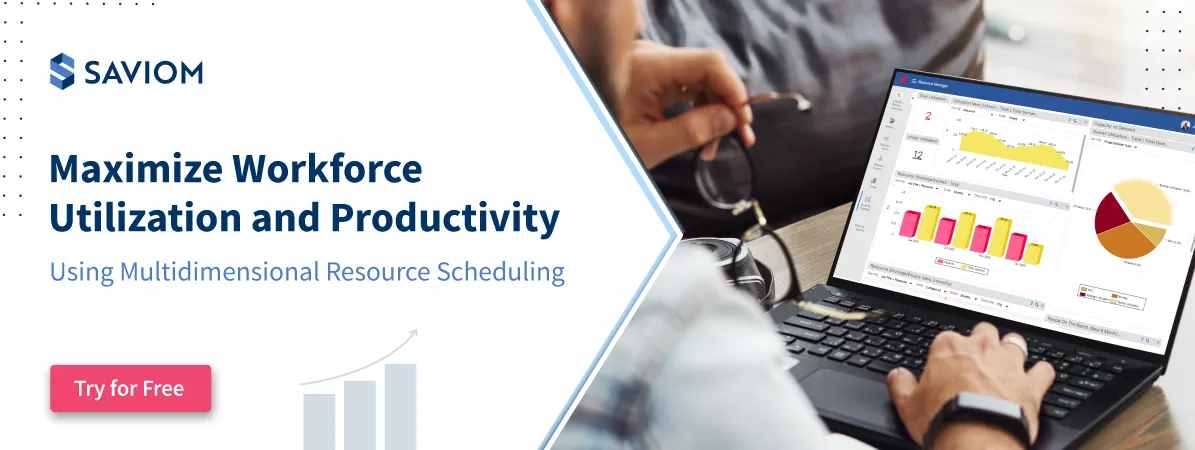“Research by Harvard University, the Carnegie Foundation, and Stanford University concludes that 85% of job success is attributed to well-developed soft and people skills, while only 15% is based on technical knowledge and hard skills.”
This insight highlights a crucial corporate reality: technical skills may open the door to career opportunities, but people skills ultimately determine how far an individual can rise. Yet, many professionals continue to prioritize technical proficiency, often overlooking the interpersonal qualities that distinguish high performers from the rest.
People skills encompass a wide range of abilities, from conveying an idea with clarity and building client relationships to defusing tense situations and leading a team to success. These capabilities play a fundamental role in helping professionals navigate complex workplace interactions and excel in their roles.
In this blog, we will explore the top 24 people skills every professional should develop to succeed in their career.
Let’s begin!
What Are People Skills?
Merriam-Webster defines people skills as, “the ability to work with or talk to other people in an effective and friendly way.”
People skills, also known as interpersonal skills, make it easier for individuals to overcome public anxiety and socialize easily. They include a wide range of abilities, such as active listening, teamwork, empathy, commitment, emotional intelligence, and more. Additionally, these skills help professionals collaborate effectively, manage conversations with tact, positively influence others, and strengthen relationships.
People skills typically fall into three categories. First, personal skill, which is the ability to present yourself and communicate confidently. Second interaction skills, which is the ability to understand others while maintaining boundaries. Lastly, problem-solving skill, which is the ability to mediate conflict and negotiate solutions to find common ground from diverse perspectives.
Now that we have understood people skills, let’s explore why they are essential.
Why are People Skills So Important?
“The most basic of all human needs is the need to understand and be understood.” ~ Dr. Ralph Nichols
Rightly said! People skills are critical in every professional setting. Irrespective of industry or role, communicating, building rapport with colleagues, and responding thoughtfully can make or break workplace dynamics. Here are some reasons why people skills in the workplace are important:
- They help individuals avoid misunderstandings by promoting clear and respectful communication.
- They help build trust between team members, clients, and stakeholders.
- People skills enable conflict resolution by encouraging individuals to understand other’s perspectives.
- They support smoother collaboration in cross-functional and multicultural teams.
- They boost overall productivity by reducing friction among team members and creating a positive environment.
- People skills also enhance leadership potential in individuals by fostering motivation and mentorship among leaders.
- They promote constructive feedback where individuals feel comfortable giving and receiving feedback.
- People skills contribute to stronger client relationships by fostering responsiveness and patience during interactions.
So far, we have explored what people skills are and why they are important. Now, we will explore the different skills that are essential in a workplace.
Read More: Leadership in Project Management: 10 Tips to Become a Good Leader
Must-Have People Skills for Professional Setting
Below are the key people skills that every professional must develop to thrive in today’s competitive work environment.

Communication Skills
Communication skills are the ability of professionals to share thoughts, information, or feelings with others clearly. It promotes understanding and makes it easier for the recipients to give feedback. They are of different types, including:
Active Listening
In every professional setting, listening is just as essential as speaking. However, simply hearing and truly understanding are two different things. Active listening means paying full attention to the speaker, understanding what is said, and responding accordingly. A good manager always listens to team ideas and insight, which fosters trust and makes them feel valued.
Verbal & Non-Verbal Communication
Verbal communication involves using spoken words to convey messages clearly and effectively. On the other hand, non-verbal communication encompasses body language, facial expressions, gestures, tone of voice, etc. Together, they shape how the message is received and interpreted. Being aware of both helps avoid misunderstandings and builds trust in professional interactions.
Read More: What is Project Communication Management? Types, Benefits & Best Practices
Written Communication
Written communication is essential for documenting information, sharing ideas, and coordinating tasks in the workplace. It includes emails, reports, memos, and other forms of written methods. This skill requires attention to grammar, format, structure, punctuation, clarity of thoughts, etc., as it reflects professionalism and helps teams avoid misinterpretation of information and confusion.
Presentation & Public Speaking
Presentation and public speaking skills are vital as they enable individuals to convey ideas and lead discussions. To master these skills, professionals should learn to organize content logically and confidently deliver their message. Public speaking also involves overcoming hesitation and speaking with clarity. Mastering both these skills can enhance employee performance in the professional world.
Read More: 9 Effective Tips on Enhancing Employee Performance at Work
Leadership & Management Skills
“Leadership is not about being in charge. It is about taking care of those in your charge.” — Simon Sinek
This quote indicates that leadership is more than just assigning tasks; it is about inspiring and guiding a team toward success. By developing these skills, leaders can handle conflicts more effectively and improve team performance. It can be categorized into:
Work Delegation
Delegation is one of the most vital people skills for professionals working in managerial positions. It refers to assigning different tasks and responsibilities to individuals to ensure improved team productivity and efficiency. Effective delegation ensures that the best-fit resources are assigned to tasks, which leads to higher-quality output, timely delivery, fair workload distribution, and optimal use of team capacity.
Team Motivation
After delegation, another important skill for managers to master is team motivation. This means the manager’s ability to keep their team inspired to constantly put in their best work to achieve the shared goal. It involves recognizing achievements and creating a positive environment. Using this skill, leaders can boost employee engagement and reduce turnover while maintaining high performance even during challenging times.
Read More: Leadership in Project Management: 10 Tips to Become a Good Leader
Mentoring & Coaching
Mentoring and coaching are human-centered skills that aid in professional growth. Mentoring entails long-term support, while coaching is short-term, skill-focused guidance. Both need active listening, empathy, and feedback. Leaders use these skills to build high-performing teams to help individuals grow, overcome obstacles, and achieve their full potential.
Giving & Receiving Feedback
This skill involves sharing constructive input and being open to receiving the same from others. Giving feedback requires clarity, empathy, and the right timing, while receiving it demands emotional intelligence, humility, and self-awareness. When done right, feedback strengthens relationships, improves employee performance, and promotes a culture of continuous learning.
Decision-Making
Decision-making is evaluating options and picking the best choice under stress. It involves scrutinizing data, balancing risks, and taking team input into consideration before coming to a decision. Good decision-makers drive progress and earn credibility by making decisions that are not just timely, well-considered, and consistent with business objectives but also supported by good judgment and foresight.
Read More: How Can You Make Data-Driven Decisions with Resource Management Software?
Relationship Building
It refers to forming and maintaining meaningful relationships with colleagues through a combination of people skills like communication, empathy, etc. It can be divided into:
Collaboration & Trust-Building
Cooperation and trust-building walk hand in hand in any effective team. These interpersonal skills entail working together toward a common objective by being open, sharing duties, and honoring each other’s contributions. Trust-building involves being dependable, honest, and cooperative. Collectively, these skills help create a workplace where thoughts are shared freely and teams showcase combined efforts.
Conflict Resolution & Problem Solving
Conflict resolution means navigating disagreements while remaining impartial and guiding individuals toward mutually beneficial outcomes. It involves active listening, emotional control, and understanding differing viewpoints without bias. This skill helps solve problems, reduce tension, and strengthen team dynamics. When handled effectively, these skills can drive innovation and ensure successful project delivery.
Read More: How to Ensure Effective Conflict Resolution in a Hybrid Office?
Networking
Networking is the art of building and sustaining professional contacts (within and beyond the office) that bring long-term benefits to both individuals. It involves initiating conversations, being in regular touch, and providing assistance without expecting benefits in the near future. This is one of the most essential people skills for jobs such as sales and business development, where connections drive results.
Influencing & Persuasion
Persuasion is the skill to get others to agree with an opinion. Therefore, it becomes a key skill for managers as they frequently need to align team members toward goals and negotiate priorities. Also, persuasion helps them to address concerns and find solutions that everyone can accept. A persuasive manager can motivate teams, build project stakeholder trust, and drive organizational success.
Read More: Who are Project Stakeholders? 7 Effective Ways to Manage Them
Emotional Intelligence
It is an important people skill that involves understanding and managing your as well as other’s emotions to cultivate awareness and empathy. It helps managers identify who is feeling work stress or burned out and navigate high-pressure situations.
Empathy
Empathy is a crucial trait that allows individuals to understand and connect with their colleagues, clients, and stakeholders on a deeper level. It involves recognizing their emotions, concerns, and challenges and offering support when needed. This skill is especially important in customer-facing and leadership roles where it is crucial to build trust and create a psychologically safe work environment.
Self-awareness & Self-regulation
Self-awareness is the knowledge of your own emotions, triggers, and behaviors, whereas self-regulation is the ability to manage them effectively. These abilities enable professionals to stay calm in stressful situations, make rational decisions, and respond instead of reacting to difficult scenarios. Together, they act as the building blocks of emotional resilience and good leadership.
Social Awareness
When a professional can accurately read and understand social situations, it is called social awareness. It also involves understanding the emotions, needs, or concerns of others. Socially aware people can effectively pick on non-verbal cues and adapt their behavior to different people and settings. This helps foster inclusivity and cross-departmental collaboration by building better interpersonal relationships at work.
Read More: 10 Ways to Improve Cross-Departmental Collaboration
Interpersonal & Social Skills
Interpersonal and social skills are the behaviors that ensure day-to-day workplace interactions are smooth and respectful. They combine a variety of skills like:
Approachability
Being approachable means creating a safe and welcoming environment where others can start conversations, ask questions, seek help, or bring up concerns. It demands a positive outlook, open communication, and a willingness to listen without judgment. Approachable professionals build stronger relationships that encourage team collaboration because they tend to be perceived as trustworthy and dependable.
Sense of Humor
A well-timed sense of humor is an excellent skill that can relieve stress, defuse tense situations, and lighten the workplace. It not only induces happiness but also makes individuals feel more comfortable. When used wisely, humor can add an easy and more humane touch to interactions, but it should never come at someone else’s expense. Leaders possessing this capability often create more engaged and resilient teams.
Patience
Patience is the ability to remain calm and composed, especially when facing tough situations. It helps reduce stress and allows for smoother collaboration with teams and clients. Practicing patience means identifying triggers, letting go of what’s beyond control, and setting realistic priorities. This is an important people skill that prevents misunderstandings and supports healthier professional relationships.
Tact
Tact is the ability to communicate tough messages that will not offend or harm relationships. It requires the combination of emotional intelligence with discretion, through which professionals can handle sensitive issues easily. Whether providing constructive feedback, managing conflict, or negotiating, tact enables one to maintain professionalism and yield positive results.
Read More: 7 Proven Ways to Give Constructive Feedback to Your Employees
Problem-solving & Adaptability
Problem-solving is an integral part of a manager’s job. It involves critical thinking and analyzing root causes to make sound decisions under pressure. Adaptability complements this by helping individuals stay flexible in changing situations. These skills can be divided into:
Negotiation
Negotiation skills are essential for managers to effectively balance project budgets, deadlines, scope, etc. A good negotiator listens to and understands different views and finds fair solutions using logic and compromise. Consequently, strong negotiation ensures mutual benefits, clarity, and business profitability. It also leads to long-term solutions, reducing future problems, and provides opportunities by building trust.
Critical Thinking
Critical thinking is the ability to assess information objectively and make reasoned judgments. It includes analyzing data, identifying patterns, questioning assumptions, and separating facts from opinions. This is an important interpersonal skill that helps critical thinkers approach problems with more logic, clarity, and an openness to alternative solutions.
Handling Difficult Conversations
Managing tough conversations is a key people skill that involves addressing sensitive topics without escalating tension. Whether it’s giving feedback, discussing performance, or resolving disagreements, it requires empathy, tact, and clear communication. Professionals who master this skill can maintain trust while navigating tough situations with confidence and precision.
Cultural Sensitivity
Cultural sensitivity is the awareness and respect for differences in values, communication styles, and traditions across cultures. In today’s globalized workspaces, this skill fosters inclusion and diversity to improve teamwork. Moreover, being culturally sensitive enables professionals to collaborate effectively with diverse teams and more thoughtfully serve clients from varied backgrounds.
Read More: What is Diversity in Project Management? Benefits, Challenges, and Strategies
Upon exploring the different types of people skills that are essential for a successful career, let’s move on to learn how to develop these skills.
How To Develop People Skills?
People skills can be developed and improved over time through continuous practice and the right strategies. Here are some ways in which one can cultivate and refine their people skills:
Master Clear & Confident Communication
Exceptional people skills begin with clear and strong communication. This involves conveying ideas and expectations with both authority and respect. To master this, it is important to speak concisely while maintaining clarity. In addition, the communication style should be adapted to fit the audience, and excessive use of jargon should be avoided when talking to non-technical people.
Additionally, managers can communicate with confidence through composed body language and a calm, professional demeanor. While assertiveness is key, it should be exercised with balance without appearing aggressive. These practices promote open dialogue and strengthen collaboration. Also, strong verbal and written communication skills minimize misunderstandings, streamline workflows, and keep projects on track.
Cultivate Emotional Intelligence
After establishing effective communication, the next step to developing people skills is cultivating emotional intelligence, which enables stronger workplace relationships. This begins with identifying emotional patterns in everyday interactions and reflecting on how certain responses affect or influence others. The goal is to become more self-aware about how you respond to others.
For example, a professional who frequently reacts impulsively during high-pressure project meetings by interrupting colleagues or displaying frustration can create tension and erode team trust. By staying mindful of emotional triggers and practicing simple techniques like deep breathing can help individuals manage their responses and give reactions that are constructive rather than reactive.
Read More: What is a Project Meeting? 9 Strategies to Conduct an Effective One
Learn To Listen Patiently
According to a PMI survey, “Active listening is among the top competencies for project leaders.”
Active listening is essential in any professional setting. Good communicators don’t just hear – they listen with patience and understanding. Moreover, patience is a cornerstone of strong leadership, requiring presence, empathy, and engagement. To achieve this, leaders must allow team members to speak without interruption while maintaining eye contact and showing interest through nonverbal actions like nodding.
In addition, listening patiently means resisting the urge to respond immediately or offer solutions. Instead, focus on absorbing what’s truly being said. Asking thoughtful, clarifying questions afterward further reinforces engagement. These habits demonstrate respect and make others feel genuinely heard, which results in stronger team dynamics and improved collaboration.
Foster a Growth-Oriented & Positive Mindset
Building on that, the next way to develop people skills is to adopt a positive growth-oriented mindset. This starts with recognizing the strengths in others and encouraging them. While challenges are inevitable, viewing them as learning opportunities can promote stability and innovation in a team. It is also important to note that a leader’s mindset truly sets the tone and direction for the entire group.
This means leaders must stay optimistic under pressure and maintain composure to uplift those around them. Leaders who foster a forward-thinking mindset create an environment of encouragement, trust, and self-improvement. For instance, when a project doesn’t go as planned, leaders with a growth mindset use the experience to identify project management lessons, insights, and ways to improve together as a team.
Read More: 12 Project Management Lessons We Can Learn from Our Favorite Superheroes
Lead with Empathy & Mutual Respect
One key step to mastering people skills is to lead with empathy and respect. To begin with, a leader should listen to the team’s concerns, show genuine care, and try to understand their perspective without being dismissive. This helps build trust and keeps communication open. Additionally, recognizing their efforts regularly, even for small tasks, makes it clear that their work is valued.
Mutual respect is what turns empathy into action. It’s about recognizing others’ perspectives without judgment and treating every interaction with fairness. This doesn’t mean agreeing with everything; rather, it means being mindful of your tone and giving credit where it’s needed. When leaders are respectful, they encourage others to do the same, leading to higher workforce efficiency and a more inclusive team culture.
Engage in Real-Life Social Interactions
Building interpersonal skills requires practice in real-world settings like networking events, team-building activities, and informal conversations with colleagues. By engaging in such social interactions, professionals can become more confident and adaptable. Moreover, observing how experienced leaders and clients communicate during meetings will help in acquiring better insights.
In addition, one should also pay attention to other people’s body language, tone of voice, and how they handle different situations. Furthermore, stepping out of one’s comfort zone and interacting with individuals from different backgrounds will help broaden perspective and enhance the ability to connect with diverse groups. These interactions will help professionals improve their people skills and also expand their network.
Read More: 7 Benefits of Virtual Team Building Activities for Remote Teams
Be Open to Feedback
Embracing feedback is very crucial for developing strong people skills. It should not be considered criticism but a strategic tool for growth. Constructive feedback provides valuable insights into areas that need improvement. However, feedback should not be a one-way process led by managers. They should actively seek input from peers and team members. This shows humility and a genuine commitment to self-improvement.
To achieve this, listen open-mindedly, avoid defensiveness, and view feedback as an opportunity for growth. After receiving feedback, professionals must intentionally apply these insights to refine their interpersonal and communication skills. A project manager who is receptive to feedback fosters an environment of trust and collaboration, ultimately leading to better team dynamics and project success.
Enroll In a Training Course
Finally, continuous learning is essential for long-term development, particularly in improving interpersonal skills. To enhance your skills, enroll in specialized programs such as leadership development series or communication skills training – each offering structured, skill-focused content. Moreover, you can attend conflict resolution workshops that include role-playing exercises to simulate real-world challenges to boost engagement.
Furthermore, formal education can be complemented with self-assessment tools like 360-degree feedback or Emotional Intelligence Appraisal to identify areas for growth. Managers can also engage in mentorship to gain insight from more experienced professionals. By integrating soft skill development into daily work through reflection, feedback, etc., individuals can continuously refine their interpersonal skills.
Read More: 10 Essential Soft Skills That Will Become Prominent in 2030
Key Takeaways: Additional Tips to Improve People Skills
People skills are not optional; they are critical assets that promote overall success in both personal and professional environments. Here are a few add-on tips to improve them: –
- Participate in group settings, workshops, volunteering, etc. This will help professionals practice communication, collaboration, and empathy in real-time.
- Stay open to others’ ideas, even when they differ from yours. This shows emotional intelligence and makes you easier to work and bond with.
- Most communication is non-verbal; your body speaks even when your mouth doesn’t. Therefore, master body language, facial expressions, and tone often speak louder than words.
- Practice making eye contact and using natural hand movements to reinforce your words. Most importantly, be confident while communicating with team members.
- Give a compliment and be specific while giving a compliment. Instead of “Nice work,” say, “I loved how you explained that concept so clearly.” This makes others feel appreciated and builds instant rapport.
What are the other must-have people skills, according to you?
The Glossary
Read More: Glossary of Resource Workforce Planning, Scheduling and Management











